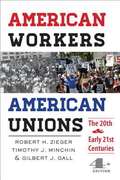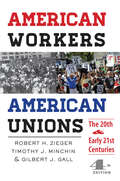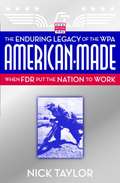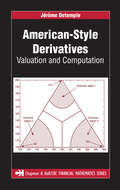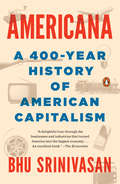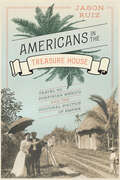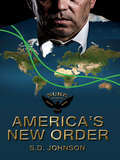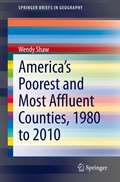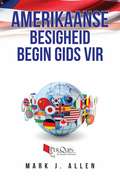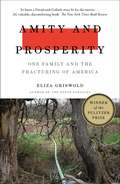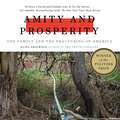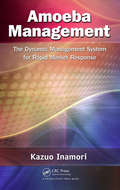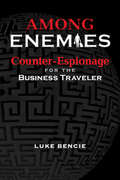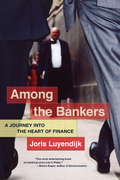- Table View
- List View
American Workers, American Unions
by Robert H. Zieger Timothy J. Minchin Gilbert J. GallHighly acclaimed and widely read since its first publication in 1986, American Workers, American Unions provides a concise and compelling history of American workers and their unions in the twentieth century and the first decade of the twenty-first. Taking into account recent important work on the 1970s and the Reagan revolution, the fourth edition newly considers the stagflation issue, the rise of globalization and big box retailing, the failure of Congress to pass legislation supporting the right of public employees to collective bargaining, the defeat in Congress of legislation to revise the National Labor Relations Act, the emasculation of the Humphrey-Hawkins Act, and the changing dynamics of blue-collar politics. In addition to important new information on the 1970s and 1980s, the fourth edition contains a completely new final chapter. Largely written by Timothy J. Minchin, this chapter provides a rare survey of American workers and their unions between 9/11 and the 2012 presidential election. Gilbert J. Gall presents new information on government workers and their recent battles to defend workplace rights.
American Workers, American Unions: The Twentieth and Early Twenty-First Centuries (The American Moment)
by Robert H. Zieger Timothy J. Minchin Gilbert J. GallAn update to the classic history of labor and unions for a post-9/11 world.Highly acclaimed and widely read since its first publication in 1986, American Workers, American Unions provides a concise and compelling history of American workers and their unions in the twentieth century and the first decade of the twenty-first. Taking into account recent important work on the 1970s and the Reagan revolution, the fourth edition newly considers the stagflation issue, the rise of globalization and big box retailing, the failure of Congress to pass legislation supporting the right of public employees to collective bargaining, the defeat in Congress of legislation to revise the National Labor Relations Act, the emasculation of the Humphrey-Hawkins Act, and the changing dynamics of blue-collar politics. In addition to important new information on the 1970s and 1980s, the fourth edition contains a completely new final chapter. Largely written by Timothy J. Minchin, this chapter provides a rare survey of American workers and their unions between 9/11 and the 2012 presidential election. Gilbert J. Gall presents new information on government workers and their recent battles to defend workplace rights.
American-Made: When FDR Put the Nation to Work
by Nick TaylorIn response to massive poverty, rampant unemployment, breadlines, and "Hooverville" shantytowns during the Great Depression, the Roosevelt administration initiated the Works Progress Administration under the leadership of Harry Hopkins as a means of putting people back to work and as a lynchpin of its New Deal program. This is a history of the WPA that describes its origins, the political controversies over its activities, its contributions to the national infrastructure and eventually to the war effort, and the cultural legacy of its arts programs. Annotation ©2008 Book News, Inc., Portland, OR (booknews.com)
American-Style Derivatives: Valuation and Computation (Chapman and Hall/CRC Financial Mathematics Series)
by Jerome DetempleFocusing on recent developments in the field, American-Style Derivatives provides an extensive treatment of option pricing with emphasis on the valuation of American options on dividend-paying assets. This book reviews valuation principles for European contingent claims and extends the analysis to American contingent claims. It presents basic valuation principles for American options including barrier, capped, and multi-asset options. It also reviews numerical methods for option pricing and compares their relative performance. Ideal for students and researchers in quantitative finance, this material is accessible to those with a background in stochastic processes or derivative securities.
Americana: A 400-Year History of American Capitalism
by Bhu SrinivasanFrom the days of the Mayflower and the Virginia Company, America has been a place for people to dream, invent, build, tinker, and bet the farm in pursuit of a better life. Americana takes us on a four-hundred-year journey of this spirit of innovation and ambition through a series of Next Big Things -- the inventions, techniques, and industries that drove American history forward: from the telegraph, the railroad, guns, radio, and banking to flight, suburbia, and sneakers, culminating with the Internet and mobile technology at the turn of the twenty-first century. The result is a thrilling alternative history of modern America that reframes events, trends, and people we thought we knew through the prism of the value that, for better or for worse, this nation holds dearest: capitalism. In a winning, accessible style, Bhu Srinivasan boldly takes on four centuries of American enterprise, revealing the unexpected connections that link them. We learn how Andrew Carnegie's early job as a telegraph messenger boy paved the way for his leadership of the steel empire that would make him one of the nation's richest men; how the gunmaker Remington reinvented itself in the postwar years to sell typewriters; how the inner workings of the Mafia mirrored the trend of consolidation and regulation in more traditional business; and how a 1950s infrastructure bill triggered a series of events that produced one of America's most enduring brands: KFC. Reliving the heady early days of Silicon Valley, we are reminded that the start-up is an idea as old as America itself.Entertaining, eye-opening, and sweeping in its reach, Americana is an exhilarating new work of narrative history.
Americanas: "We Always Want More"
by Boris Groysberg Sarah L. AbbottBeto Sicupira had joined Americanas, a leading retailer in Brazil, in 1981. 2021 marked forty years since Sicupira's arrival, and the anniversary prompted him to reflect on what had been accomplished and on where the organization was headed. Americanas' growth strategy was centered around offering an increasing assortment of products and services through a broad range of channels. Was this the right strategy to ensure Americanas' success going forward?
Americans in the Treasure House: Travel to Porfirian Mexico and the Cultural Politics of Empire
by Jason RuizWhen railroads connected the United States and Mexico in 1884 and overland travel between the two countries became easier and cheaper, Americans developed an intense curiosity about Mexico, its people, and its opportunities for business and pleasure. Indeed, so many Americans visited Mexico during the Porfiriato (the long dictatorship of Porfirio Díaz, 1876–1911) that observers on both sides of the border called the hordes of tourists and business speculators a “foreign invasion,” an apt phrase for a historical moment when the United States was expanding its territory and influence. Americans in the Treasure House examines travel to Mexico during the Porfiriato, concentrating on the role of travelers in shaping ideas of Mexico as a logical place for Americans to extend their economic and cultural influence in the hemisphere. Analyzing a wealth of evidence ranging from travelogues and literary representations to picture postcards and snapshots, Jason Ruiz demonstrates that American travelers constructed Mexico as a nation at the cusp of modernity, but one requiring foreign intervention to reach its full potential. He shows how they rationalized this supposed need for intervention in a variety of ways, including by representing Mexico as a nation that deviated too dramatically from American ideals of progress, whiteness, and sexual self-control to become a modern “sister republic” on its own. Most importantly, Ruiz relates the rapid rise in travel and travel discourse to complex questions about national identity, state power, and economic relations across the U. S. –Mexico border.
America’s New Order
by S. D. JohnsonThis is a fictional story about wealthy entrepreneur, Henry Riley, and his obsessive need to control the United States of America. Backed by his political New Order Party, are members determined to create a new society, a new order for the working class. From his three children, Henry plans to have his eldest son at the helm. Supported by their family’s private firm, NUKE Security, and a privatized U.S. military, by 2037, he will control the U.S. under unlimited unilateral power, enacting new decrees and laws, while using technological advancements to control the American people. Truth is in the fiction.
America’s Poorest and Most Affluent Counties, 1980 to 2010 (SpringerBriefs in Geography)
by Wendy ShawThis book explores the changing spatial distribution of the United States of America's poorest and most affluent counties over the 30 years from 1980 to 2010. While overall rates of poverty have changed somewhat during this period, the geography of counties where affluence and poverty rates are the highest have also shifted as economic fortunes wax and wane. The spatial understanding of poverty and affluence is an important dimension of addressing the complex economic and social contexts within which poverty occurs, and which vary substantially depending on several factors. While there has been significant focus on poverty in the United States, including some analysis of its spatial characteristics, since the 1960s there has been relatively little research on the concomitant geography of affluence. The geographies of poverty and affluence analyzed in this book give a view of spatial economic segregation. Spatial aspects of both the poorest and most affluent counties are focused on, as well as the changing gap and relative geographies between rich and poor over three decades.
America�s Culture of Professionalism
by David Warfield BrownAmerica's Culture of Professionalism proves an emerging culture of interdependence is possible if and when enough professionals and laypersons refashion their roles and relationships having both something to contribute and something to learn from each other.
Americhem: The Gaylord Division (A-1)
by David A. GarvinThe Gaylord Division of Americhem, a large chemical company, is in the midst of the first use of a new zero-base budgeting system. The general manager of the division leading the process is experiencing disagreement and conflict among the members of the senior management team. This case describes a difficult meeting. A rewritten version of an earlier case.
Americhem: The Gaylord Division (B-1)
by David A. GarvinSupplements the (A) case, 314011. A rewritten version of an earlier supplement.
Amerikaanse besigheid begin gids vir locksmith
by Mark J. AllenDie Amerikaanse besigheid module is gerig aan al die ambisie volle en hardwerkende individue wat strewe na ‘n voorspoedige manier van lewe
Amgen Inc.'s Epogen--Commercializing the First Biotech Blockbuster Drug
by Felix Oberholzer-Gee Dennis YaoAmgen Inc.'s Epogen was the first biotech blockbuster drug. Epogen helped prevent anemia, a condition that leads to severe fatigue, increased risk of cardiovascular disease, and even death. At the time, the market for Epogen, which included dialysis patients and persons with cancer undergoing chemotherapy, was estimated to be a $1 billion opportunity. After a critical scientific breakthrough, which allowed Amgen to identify the EPO gene, the company applied for a number of patents to protect its achievement. However, much to its surprise, Amgen learned that EPO had already been patented. Genetics Institute, the holder of the patent, demanded a royalty-free cross-license. Amgen's manager needed to decide how best to compete with its rival.
Amgen, Inc.: Planning the Unplannable
by Nitin Nohria James D. BerkleyBy the early 1990s, Amgen--a pharmaceutical company started little over a decade ago as Applied Molecular Genetics--was within range of becoming a billion-dollar company. With two extremely successful biotechnology drugs on the market, Amgen stood as the largest and most powerful independent company of its type in the world. Top executives in the company viewed long-range planning as an important ingredient in the firm's success; many others--including some of the firm's scientists--were less sure. With Amgen's sales expected to continue to grow rapidly, the firm's long-range planning process would be put to the test. Shows the different, sometimes paradoxical perspectives held within a single, dynamically changing company toward the issue of long-range planning. Students are challenged to synthesize these views into a coherent picture of a firm's growth amid great uncertainty.
Amiga, deja de disculparte: Un plan sin pretextos para abrazar y alcanzar tus metas
by Rachel HollisRachel Hollis, autora del superventas y fundadora de TheChicSite.com, exhorta a las mujeres a dejar de disculparse por sus deseos, esperanzas y sueños y, en cambio, perseguirlos con pasión y confianza.Rachel ha sido testigo con frecuencia de mujeres que tienen temor de lograr sus propios objetivos. Temen pasar vergüenza, no alcanzar la perfección o no ser lo suficientemente valiosas. Pero el mayor temor de todos es ser juzgadas por el solo hecho de tener una ambición.Habiendo aprendido a definirse a sí mismas a la luz de otras personas –ya sea como esposas, madres, hijas o amigas– muchas mujeres han olvidado quiénes son en realidad y quiénes deberían ser. En este libro la celebridad emprendedora en línea, Rachel Hollis, alienta a las mujeres a ser dueñas de sus esperanzas, deseos y metas, y les recuerda que no tienen que pedir permiso para desear alcanzar más. Con un llamado a las mujeres de todo el mundo para que no dejen de hablar de sus sueños, Hollis identifica las excusas de las que tienen que liberarse, los comportamientos que deben adoptar y las habilidades que necesitan adquirir, en el camino hacia el crecimiento, la confianza y la mejor versión de sus vidas.
Amil and the Health Care System in Brazil
by Regina E. Herzlinger Ricardo Reisen de PinhoDr. Edson Bueno created Amil, Brazil's largest health insurer. Unlike many others, it is vertically integrated. Dr. Bueno has two opportunities for growth. Which, if any, should he pursue?
Amity and Prosperity: One Family and the Fracturing of America - Winner of the Pulitzer Prize for Non-Fiction 2019
by Eliza GriswoldWinner of the 2019 Pulitzer Prize for General Nonfiction'At heart a David and Goliath story fit for the movies ... [A] valuable, discomforting book' The New York Times Book ReviewSeven years in the making, Amity and Prosperity tells the story of the energy boom's impact on a small town at the edge of Appalachia and of one woman's transformation from a struggling single parent to an unlikely activist.Stacey Haney is a local nurse working hard to raise two kids and keep up her small farm when the fracking boom comes to her hometown of Amity, Pennsylvania. Intrigued by reports of lucrative natural gas leases in her neighbours' mailboxes, she strikes a deal with a Texas-based energy company. Soon trucks begin rumbling past her small farm, a fenced-off drill site rises on an adjacent hilltop, and domestic animals and pets start to die. When mysterious sicknesses begin to afflict her children, she appeals to the company for help. Its representatives insist that nothing is wrong.Alarmed by her children's illnesses, Haney joins with neighbours and a committed husband-and-wife legal team to investigate what's really in the water and air. Against local opposition, Haney and her allies doggedly pursue their case in court and begin to expose the damage that's being done to the land her family has lived on for centuries. Drawing on seven years of immersive reporting, prizewinning poet and journalist Eliza Griswold reveals what happens when an imperilled town faces a crisis of values, and a family wagers everything on an improbable quest for justice.
Amity and Prosperity: One Family and the Fracturing of America - Winner of the Pulitzer Prize for Non-Fiction 2019
by Eliza GriswoldWinner of the 2019 Pulitzer Prize for General NonfictionSeven years in the making, Amity and Prosperity tells the story of the energy boom's impact on a small town at the edge of Appalachia and of one woman's transformation from a struggling single parent to an unlikely activist.Stacey Haney is a local nurse working hard to raise two kids and keep up her small farm when the fracking boom comes to her hometown of Amity, Pennsylvania. Intrigued by reports of lucrative natural gas leases in her neighbours' mailboxes, she strikes a deal with a Texas-based energy company. Soon trucks begin rumbling past her small farm, a fenced-off drill site rises on an adjacent hilltop, and domestic animals and pets start to die. When mysterious sicknesses begin to afflict her children, she appeals to the company for help. Its representatives insist that nothing is wrong.Alarmed by her children's illnesses, Haney joins with neighbours and a committed husband-and-wife legal team to investigate what's really in the water and air. Against local opposition, Haney and her allies doggedly pursue their case in court and begin to expose the damage that's being done to the land her family has lived on for centuries. Drawing on seven years of immersive reporting, prizewinning poet and journalist Eliza Griswold reveals what happens when an imperilled town faces a crisis of values, and a family wagers everything on an improbable quest for justice.(P)2018 Macmillan Audio
Amoeba Management: The Dynamic Management System for Rapid Market Response
by Kazuo InamoriEspecially effective in dynamic and highly competitive environments, the Amoeba Management System has received attention from the Harvard Business Review and has already been successfully adopted at more than 400 companies around the world. At the heart of this innovative management system is a business philosophy based on doing the right thing as
Among Enemies: Counter-Espionage for the Business Traveler
by Luke Bencie William J. EspositoEach business day, some 35,000 executives, scientists, consultants, and lawyers pass through the nation's airports to destinations across the globe. They carry, along with proprietary documents and computer files, the latest in personal electronic gear. However, carefully watching most of those travelers--beginning the moment they arrive at the airport and often sooner--are uncounted numbers of espionage operatives. These individuals work for foreign intelligence services and economic concerns and seek to separate international business travelers from their trade secrets. To succeed, they use many time-tested techniques to lure unsuspecting travelers into vulnerable or compromising positions. They also employ the latest electronic means to steal business information often at a distance from their prey. This is the 21st century, after all, and economic and industrial espionage have become multibillion-dollar enterprises, utilizing a wide array of the most sophisticated means to obtain proprietary information. Luke Bencie is a veteran of this struggle. He knows intimately the threats business travelers face and how to combat those threats. In Among Enemies: Counter-Espionage for the Business Traveler, Bencie provides everything you need to know to protect yourself and your company from attempted espionage.
Among the Bankers: A Journey into the Heart of Finance
by Joris LuyendijkJoris Luyendijk, an investigative journalist, knew as much about banking as the average person: almost nothing. Bankers, he thought, were ruthless, competitive, bonus-obsessed sharks, irrelevant to his life. And then he was assigned to investigate the financial sector. Joris immersed himself in the City--London's equivalent of Wall Street--for several years, speaking to over 200 people--from the competitive investment bankers and elite hedge-fund managers to downtrodden back-office staff, reviled HR managers, and those made redundant in the regular 'culls'. Breaking the strictly imposed code of secrecy and silence, these insiders spoke on record about what they actually do all day, how they see the toxic environment in which they work, and how they think the uninitiated see them. They confessed to feeling overwhelmed by the intransparency of our financial systems. They admitted that when Lehman Brothers went down in 2008 they hoarded food, put their money in gold, and prepared to evacuate their children to the countryside. They agreed that nothing has changed since the crash. A strange thing happens when you spend time among the bankers . . . you start to sympathize with them. What if the bankers themselves aren't the real enemy? What if the truth about global finance is more sinister than that?
